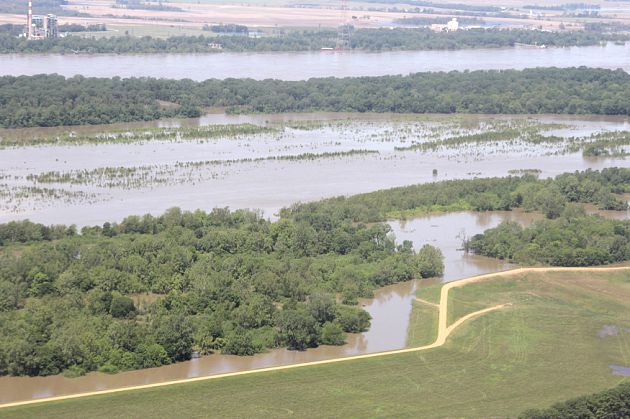
Delta farmers bracing for long battle with flood waters
Floodwaters in the lower Mississippi Valley are being driven by an unprecedented amount of water from the Ohio River.The mainline levee that protects the Mississippi Delta from flooding appears to be in good shape, according to Corps of Engineers officials.Flooding will occur as the water overtops the Yazoo River Backwater Levee System, but damage will not be as severe as it would be if the levee breaks at some point.

Farmers in the Delta region may have to deal with flood waters from the Mississippi River and its tributaries for longer than they might have expected or hoped for, the commander of the Corps of Engineers’ Vicksburg District said.
Col. Jeff Eckstein, who is responsible for flood risk management in Arkansas, Louisiana and Mississippi, said the conditions resulting from the “unprecedented” levels of water in the Ohio River and the unusually heavy rains in the Mid-South could last to mid-June or longer.
“There are situations we’ve never seen before that we’re going to see as we go through this event,” he said at the Delta Council annual meeting in Cleveland, Miss., Friday (May 6).
“We’re not going to have the crest in the river at Vicksburg, Miss., until May 20, and here we are today talking about that.”
Middle of June
Farmers could have to deal with flooded conditions for weeks, if not months, he said. “We could have these conditions until the middle of June.”
Col. Eckstein was one of 12 speakers from federal and state agencies who briefed members and guests of the Delta Council on the flood conditions. The Council dispensed with its scheduled program because of the severity of the flood threat along the Mississippi River and the Yazoo River Basin in the South Delta.
As many as 1.2 million acres of cropland in Mississippi could be affected under the “worst-case” scenario laid out by Col. Eckstein. Combine that with the flooding also taking place in Missouri, Arkansas, Tennessee and north Louisiana, and you have the makings of a true disaster in the Mid-South.
“We’re in the third largest river watershed in the world,” said Eckstein. “Much of that water comes from the Ohio River Valley, and that’s what’s driving the water down here. They have had unprecedented amounts of rainfall up there. The National Weather Service estimates they have had at least 600 percent of their annual rainfall this year.”
The Corps of Engineers designed three floodways to help relieve pressure on the Mississippi River levees following the disastrous 1927 flood. Those three are the Birds Point-New Madrid, which was opened on May 2 in Southeast Missouri, the Morganza in Northeast Louisiana and the Bonnet Carre Floodway just above New Orleans.
Operate all three
“We have never operated all three of those floodways at the same time, never,” said Eckstein. “This year, we think we’re going to have to operate all three. (The day before the Delta Council meeting, the Corps decided to open the Bonnet Carre floodway to divert water into Lake Ponchartrain. No decision had been made on the Morganza floodway at press time.”)
The good news, he said, is that the mainline levee from north of Tunica, Miss., to Vicksburg, appears to be in good shape. Under a levee certification program that began more than a year ago, Corps of Engineers personnel have walked the mainline levee, and they believe the structure will hold.
“We’re going to be able to maintain three feet of freeboard all the way down the levee,” he said. “So at that 57.5-foot crest at Vicksburg, we’re going to have three feet of levee above that.”
The Yazoo River Backwater Levee will have water going over it because it is designed to be overtopped, the colonel said. If, for some reason, the Yazoo Backwater Levee failed, about 1.2 million acres of cropland will be flooded. “We do not expect that to happen, but we believe we have to be prepared for that possibility.
Whether the Yazoo River backwater flooding reaches the worst-case scenario presented by Col. Eckstein or not, farmers will suffer large losses in the weeks ahead, according to another member of Gov. Haley Barbour’s flood task force who spoke at the annual meeting.
Entire Delta affected
“I can promise you the entire Delta from Tunica County to Vicksburg will be affected by this in one way or another,” said Andy Prosser, bureau director for market development for the Mississippi Department of Agriculture and Commerce.
“Our office in tandem with the USDA Farm Service Agency and the Risk Management Agency will be keeping track of the situation as the waters come. A lot of what we will be doing in terms of crop loss estimates will come later. How long water stays on the land, what areas are affected will all have an impact on crops like standing wheat that is only weeks from harvest.”
About the Author(s)
You May Also Like





